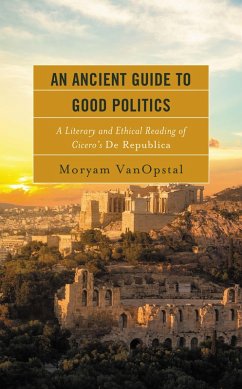An Ancient Guide to Good Politics: A Literary and Ethical Reading of Cicero's De Republica illuminates Cicero's subtlety of craft and thought in his most painstakingly written dialogue. As Cicero-notable among ancient thinkers for his accomplishments as a statesman and as a philosopher-has enjoyed a resurgence of interest in recent decades, scholars are discovering in Cicero's De Republica (On the Republic) an original, insightful, and relevant teaching on republicanism, liberty, leadership, and citizenship. Through a close reading of this work, Moryam VanOpstal highlights Cicero's ingenuity in addressing age-old philosophical and political questions related to the best way of life, the relationship of justice and law, the founding of republics, the cycles of regimes, the guide of the republic, and the mixed regime. Instead of offering simplistic teachings on duty, power, and justice, Cicero presents us with reflections and puzzles that turn the question back to us, pointing us to deeper unities than the disparate appearances of things might suggest. VanOpstal shows that Cicero intended his dialogue as a provocation for us to live lives that are more fully characterized by noble thought and thoughtful deed.
Bitte wählen Sie Ihr Anliegen aus.
Rechnungen
Retourenschein anfordern
Bestellstatus
Storno









